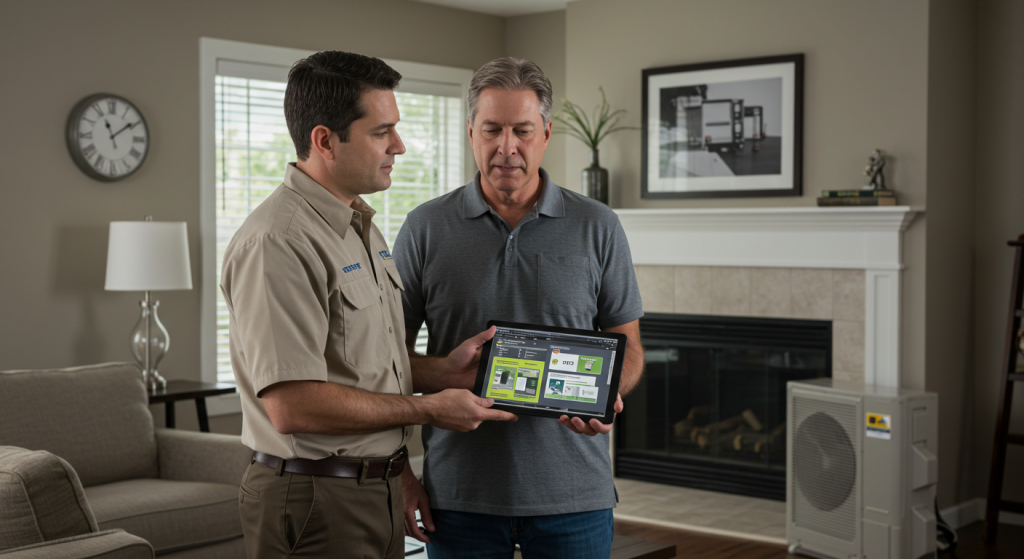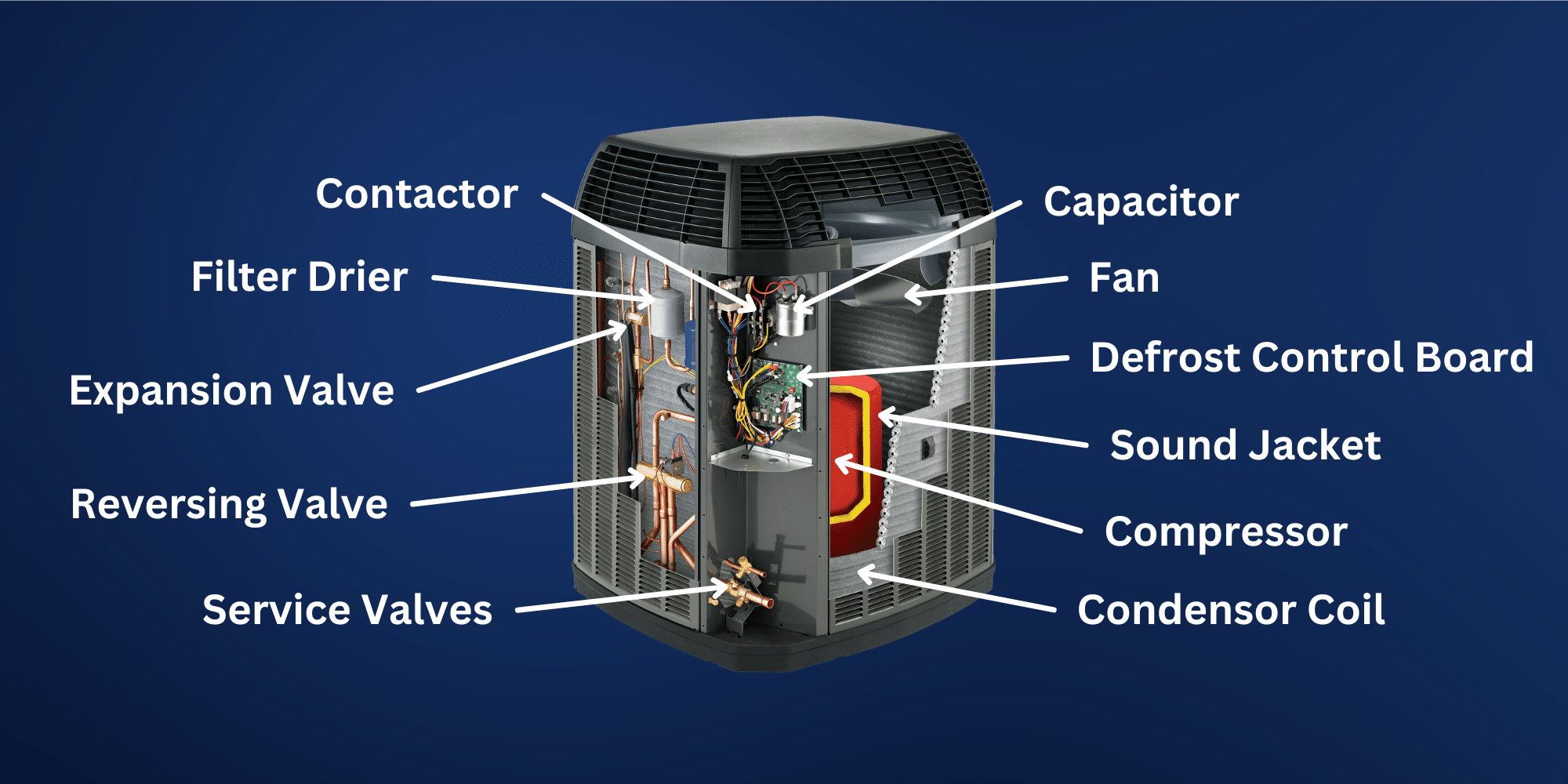If you’re a homeowner in Delaware, you’ve probably heard about heat pumps but might not know exactly how they work or if they’re right for your home. Understanding heat pumps can save you money on energy bills and keep your home comfortable year-round.
You’ll discover what makes heat pumps a smart choice for Delaware homes, how they operate, and what you need to consider before making a decision. Keep reading to learn how a heat pump could transform your home’s heating and cooling—and why it might be the upgrade you’ve been looking for.
Benefits Of Heat Pumps
Heat pumps offer many benefits to homeowners in Delaware. They provide an efficient way to heat and cool homes. These systems work by moving heat instead of creating it. This method uses less energy and lowers utility bills.
Heat pumps also reduce environmental impact. They use renewable energy from the air or ground. This makes them a cleaner choice than traditional heating systems. Homeowners can enjoy comfort and help the planet at the same time.
Energy Efficiency
Heat pumps use less electricity than furnaces or air conditioners. They transfer heat rather than generate it. This process saves a lot of energy. Many models have high efficiency ratings. This means they use power wisely and reduce waste.
Cost Savings
Lower energy use means smaller monthly bills. Heat pumps can cut heating and cooling costs significantly. They often qualify for rebates and tax credits. These savings help offset installation costs. Over time, homeowners save money on energy expenses.
Environmental Impact
Heat pumps produce fewer greenhouse gas emissions. They rely on natural heat sources like air or ground. This reduces reliance on fossil fuels. Using a heat pump helps decrease your carbon footprint. A cleaner home heating option for Delaware residents.

Credit: www.creativecomfortsolutions.com
Types Of Heat Pumps
Homeowners in Delaware have several heat pump options. Each type works differently and suits different needs. Knowing these types helps choose the right system for your home.
Air Source Heat Pumps
Air source heat pumps move heat between your house and outside air. They work well in mild climates. These pumps are easier to install and cost less. They provide heating in winter and cooling in summer.
Ground Source Heat Pumps
Ground source heat pumps use the earth’s stable temperature. Pipes buried underground transfer heat to and from your home. These pumps are very efficient but need more space. Installation costs are higher but energy savings last long.
Hybrid Heat Pumps
Hybrid heat pumps combine a heat pump with a traditional furnace. The system chooses the best method based on weather. This setup saves energy during cold winters. It gives reliable heat while lowering bills.
Heat Pump Performance In Delaware Climate
Heat pumps are a popular choice for Delaware homeowners. They provide both heating and cooling. Understanding how they work in Delaware’s climate helps make smart decisions. Delaware has mild winters and warm summers. Heat pumps perform well here but knowing the details is important.
Cold Weather Efficiency
Delaware winters are usually mild but can have cold days. Heat pumps work by moving heat from outside to inside. When temperatures drop below freezing, they become less efficient. Modern heat pumps handle cold weather better than older models. Some use special technology to keep working well. This means you stay warm without high energy bills.
Seasonal Adaptability
Heat pumps adjust to both warm and cool seasons. In summer, they cool your home by removing heat. In winter, they reverse to warm your space. This dual function saves space and money. Delaware’s changing weather suits heat pumps well. They provide comfort year-round with less maintenance than separate systems.
Installation Considerations
Installing a heat pump in your Delaware home requires careful planning. Proper installation ensures the system works efficiently and lasts longer. Consider these key points before starting the process.
Sizing And Placement
Choosing the right size heat pump is crucial. A unit too large wastes energy, while one too small won’t heat or cool well. Experts usually perform a load calculation to find the perfect size.
Placement matters for performance and noise. Outdoor units should sit on a flat, stable surface with good airflow. Avoid spots near windows or bedrooms to reduce sound disturbances.
Professional Installation
Hiring a licensed technician is essential. Professionals understand local climate and home needs. They connect the system safely and test it thoroughly. Incorrect installation can cause poor performance and costly repairs.
Permits And Regulations
Delaware may require permits before installing a heat pump. These rules ensure safety and compliance with local codes. Check with your city or county office to get the right permits. Ignoring regulations can lead to fines and delays.
Maintenance Tips
Maintaining a heat pump is key for good performance and long life. Simple steps help keep your system running smoothly. Regular care prevents breakdowns and saves money. Homeowners in Delaware should know these easy maintenance tips for their heat pumps.
Regular Inspections
Check your heat pump at least twice a year. Look for signs of wear or damage. Inspect the outdoor unit for leaves, dirt, or debris. Make sure nothing blocks air flow around the unit. Schedule a professional check every year for safety and efficiency.
Cleaning And Filter Replacement
Clean the outdoor coils and indoor unit regularly. Dirty coils reduce heat pump efficiency. Replace or clean air filters every one to three months. Clean filters improve air flow and keep the system healthy. Use the right filter type for your model.
Troubleshooting Common Issues
Listen for unusual noises from the heat pump. Strange sounds may signal a problem. Check the thermostat settings if the system does not start. Clear ice or frost from the outdoor unit in winter. Reset the system by turning it off and on again.

Credit: 1stchoicemechanicalaz.com
Incentives And Rebates In Delaware
Homeowners in Delaware can save money by using heat pumps. The state offers many incentives and rebates to lower the cost. These programs help make heat pumps more affordable and energy efficient.
Understanding these offers helps you choose the best option for your home. Savings can come from the state, federal government, or utility companies. Each has different rules and benefits to explore.
State Programs
Delaware has programs that support heat pump installation. The Delaware Sustainable Energy Utility (SEU) offers rebates for energy-efficient heat pumps. These rebates reduce the upfront cost and encourage cleaner energy use. Check with SEU for current offers and eligibility.
Federal Tax Credits
The federal government provides tax credits for heat pump buyers. These credits lower your federal tax bill after installation. The Inflation Reduction Act expanded these credits, making them more valuable. Tax credits can cover a significant part of the heat pump cost.
Utility Company Offers
Many Delaware utility companies offer rebates for heat pump customers. These incentives vary by company and region. Utility rebates can include cash back or bill credits. Contact your local utility to learn about specific offers available to you.
Comparing Heat Pumps To Traditional Systems
Choosing the right heating and cooling system is important for Delaware homeowners. Heat pumps and traditional systems offer different benefits and drawbacks. Understanding these differences helps make a smart choice for your home comfort and budget.
Heating Efficiency
Heat pumps move heat instead of creating it. This process uses less energy than traditional furnaces. They work best in mild winters like Delaware’s. Traditional systems burn fuel to create heat. This can cost more and waste energy.
Cooling Performance
Heat pumps also cool your home by reversing the heating process. They provide steady, even cooling. Traditional air conditioners only cool and need a separate heating system. Heat pumps combine both functions in one unit. This can save space and equipment costs.
Long-term Costs
Heat pumps usually cost more upfront than traditional systems. The energy savings lower monthly bills over time. Maintenance is simpler and cheaper for heat pumps. Traditional systems may need more repairs and fuel expenses. Over years, heat pumps often prove more affordable.

Credit: www.watkinsheating.com
Frequently Asked Questions
What Is A Heat Pump And How Does It Work?
A heat pump moves heat from outside to inside your home for heating and cooling.
Are Heat Pumps Energy-efficient For Delaware Homes?
Yes, heat pumps use less electricity than traditional heaters, saving energy and money.
Can A Heat Pump Handle Delaware’s Cold Winters?
Modern heat pumps work well in cold weather, keeping homes warm even in winter.
How Much Does Installing A Heat Pump Cost In Delaware?
Installation costs vary but usually range between $3,500 and $7,000 depending on home size.
What Maintenance Do Heat Pumps Require For Best Performance?
Regular filter changes and annual professional check-ups keep heat pumps running efficiently.
Conclusion
Heat pumps offer an efficient way to heat and cool Delaware homes. They save energy and reduce bills. Choosing the right system depends on your home’s size and needs. Proper installation and maintenance keep the heat pump working well. Understanding these points helps you make a smart choice.
Stay comfortable year-round with a reliable heating solution. Keep these facts in mind for a warmer, greener home.
